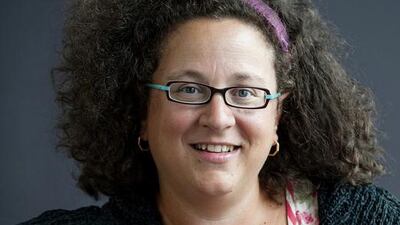In a sterile boardroom in a Dubai hotel, there are dead bodies strewn all over the place.
There is the vicar nailed to his church’s cross, a socialite drowned in an infinity pool, a Pope being poisoned by one of his own devotees and a millionaire locked in his own panic room and left to die.
Behind such gruesome endings are an assortment of mothers, construction workers, marketing managers and even a 15-year-old schoolgirl, all hungry to learn how to dispose of the evidence while keeping everyone guessing.
For this gathering of 12 recruits with murder in mind, assembled in the Antibes conference room in the Sofitel Dubai Jumeirah Beach hotel, have signed up to a three-day course on how to write a great mystery story, led by Sophie Hannah. Her successful revival of Agatha Christie’s Belgian sleuth Hercule Poirot makes Hannah the perfect teacher to share top tips on how to keep readers riveted until the last page.
“The most successful books are the ones whose first pages do a whole range of useful things,” says Hannah. “[The writer] Ruth Rendell always said you have to hook your reader with the first line.
“There does not have to be a dead body in the first page but you do need to make it clear it is a crime novel with the sense of lots being at stake. If you get that feeling quickly and efficiently [as a reader], you are far more likely to read on.”
Hannah herself looks as if butter wouldn’t melt. Mumsy with wanton hair, floral-patterned tops and flip-flops, she barely raises an eyebrow wandering through the lobby of the hotel, which is hosting the Emirates Literature Foundation event.
In person too she is extraordinarily down to earth, peppering her teaching with humorous anecdotes and breaking down an art form cloaked in mystery for many of her students into easily surmountable challenges.
Hannah starts by telling our class of 12 (they are whittled down to nine by the end of the workshop, although that is more likely down to the early hour than a mystery for Miss Marple) to write a blurb for a mystery novel, one which we never have to write.
Afterwards she tells us reverse psychology can sometimes unlock a writer’s imagination.
“Saying you do not have to write it actually inspires you,” she says. “It is easier to improve a flawed thing that exists than to work on something that does not exist.
“Give yourself permission to write something flawed. The most important thing is [to] finish your first draft.”
The exercise inspires Belgian art historian and tour guide Renilde Vervoort, 56, who has a doctorate in Dutch witchcraft representations from 1450 to 1700, to come up with a fanciful idea about a plot to topple the Pope, centring on a 13th century magical manuscript. Hannah says the more outlandish the idea, the better – but adds it has to be matched by an equally unexpected ending while still being plausible.
“You have to plant clues and the reader has to see them,” she says. “You want the reader to think: ‘Of course, it was mentioned 15 times but I never noticed it.’”
She is an advocate of having a firm plan in place before starting to write so the only surprises are for the reader.
“I see it as an essential part of the process. I think of it like an architectural plan of a house.”
A strong believer in lists and constructing stories methodically, she shares her top-10 tips on crime writing essentials – what to include on a first page, how to structure a plot and how to fix a novel if it is not working.
She advises attendees to “mislead the reader. A fair novel will set up who the culprits are but you have failed if the reader can see what the pay-off will be.”
Hannah’s focus is on dispelling some of the myths surrounding writing, pointers which can apply to all kinds of novels, not simply murder mysteries. She arms her protégés with the skills to start telling engaging, suspense-filled stories and gives encouraging advice.
Praise is lavished on Swedish Ebba Skoog, whose opening for a sophisticated psychological thriller set in a maximum security hospital is described by Hannah as “almost 100 per cent perfect. Your writing is very precise. It’s like a Swiss watch – precision-engineered.”
Skoog, a pupil at the English College Dubai, then startles the class by revealing she is still only 15.
“I have always been a big reader so I wanted to write something of my own,” she says.
“Until now I have never shown what I have written to anyone else. I did not know how to write a mystery novel but this has given me a lot of pointers.”
Some of the class, like marketing executive Kate Lillie, 36, are beginners and simply looking for the encouragement to start pursuing their passion; others, like Dubai Eye presenter Brandy Scott, have been writing for years and are looking for techniques to hone their craft.
Hannah says she hopes they leave with a strong framework in which to begin.
“A lot of writers place their energy into worrying about the process of writing but because you can never be objective about your writing, there is no point in worrying,” she says.
“Treat it like a game and give yourself permission for it to be more fun.”
Tahira Yaqoob is a freelance journalist based in Dubai and a regular contributor to The National.

